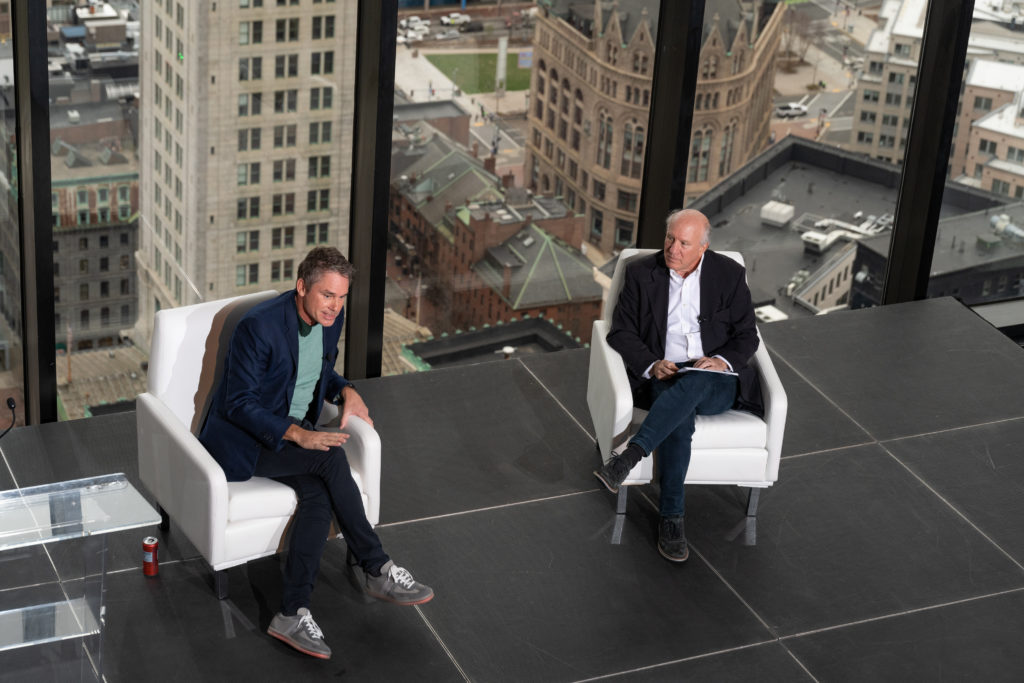Discovering Where You’re at Your Best in Life and Work


If there’s something in workplace culture that Marcus Buckingham can’t stand, it’s the outside-in method. “It starts in school, where pupils are vessels who have to absorb notions, which will then be measured in standardized tests,” he said. “All your life you’re measuring against the model, and your uniqueness is an impediment,” he said.
In the last four to five years, Buckingham, the best-selling author and leading researcher in the field of human performance, has taken a long look in the mirror to take stock of his own life. The years were marked by grief, loss, rebound, and the sale of his company. “What are you doing? What kind of mark are you leaving?” he would ask himself, Buckingham said in a candid conversation with Harvard Business Review editor-in-chief Adi Ignatius at From Day One’s Boston conference on the realignment of the relationship between workers and their employers.
Buckingham has just published Love and Work: How to Find What You Love, Love What You Do, and Do It for the Rest of Your Life, a book that is meant to debunk what the adage “do what you love” means in practical terms and how we can achieve that. “Most people don't love what they do, but they do find love in what they do,” said. “When you find highly successful people in their job, you see the love in it. You can feel yourself vanishing into what you're doing.”
Because of the pandemic, we are, ultimately, changed creatures, and companies that get in sync with where we are emotionally are going to be the best for people, Buckingham said. At the core of this emotional and professional shift is a more thorough understanding of love in work.
Managers Need to Love Employees
Relationships can be about complementing one another, about sharing values, about giving or finding protection. Ultimately, though, it’s to “see” the other person, which in a working relationship requires an investment of time. For example, in a health care setting, when the ratio between supervisors and nurses is 1:60, Buckingham observed, it’s a recipe for burnout. “Love means seeing a person, and have another person feel seen.”
This means a good manager would not want to perfect you, because they see you in your entirety, he said. They help the employee become a more intuitive version of themselves. “Tough love, sometimes, it’s necessary, I am sure some of you felt that,” he said. “But a loving relationship at work is I want you to grow. Why? Because I care about you. That isn’t easy. Humans are complicated.”
This extends to HR leaders. “We’ve just done research on HR, and what the experience of people of HR is,” said Buckingham. “If you see HR as value-promoting, you are eight times more likely to advocate for the company as a place to work for friends and family and four times less likely to say that you have an intent to leave.”
Performance Evaluations Are Obsolete
The traditional, annual evaluations are not a reliable metric, Buckingham believes. “If you wanted to make a better system, first of all, you’ve got to bifurcate performance measurement and performance development,” said Buckingham, who adds that development is happening all the time. Thus, weekly check-ins are ideal. After all, each society on Earth came up with seven-day-week calendars. And when you were in school, you were not asked to take stock of your grades just once a year.
“If you can’t check in each week, you are managing too many people,” he said. “If you don’t want to do it 52 times a year, don’t manage people.” Standard performance evaluations are also unable to harness uniqueness, and there’s a good argument for that. Case in point: In an emergency room, 60 nurses are bound to be unique, have different strengths, and give different outcomes. If they all had the same set of competences, that would not be reflective of the real-life situations they deal with.

Starting With Simple Behavioral Modifications
In terms of talent outreach, HR should scream loudly “we’re interested in you as an individual,” Buckingham recommended. A manager, by contrast, should make a team a home for a wide variety of individuals. The notion of there-is-no-I-in-team, he said, is obsolete. “We make teams to make a home for uniqueness,” he said.
Buckingham added some personal advice: If you begin your day with “getting through it” as your main goal, you should start finding activities you look forward to, aiming to love at least 20% of your work. “While you’re doing it, time flies by. When you’re done, you feel mastery,” he said. “Look for moments like that in your everyday life.”
Angelica Frey is a writer and a translator based in Milan and Brooklyn.
The From Day One Newsletter is a monthly roundup of articles, features, and editorials on innovative ways for companies to forge stronger relationships with their employees, customers, and communities.